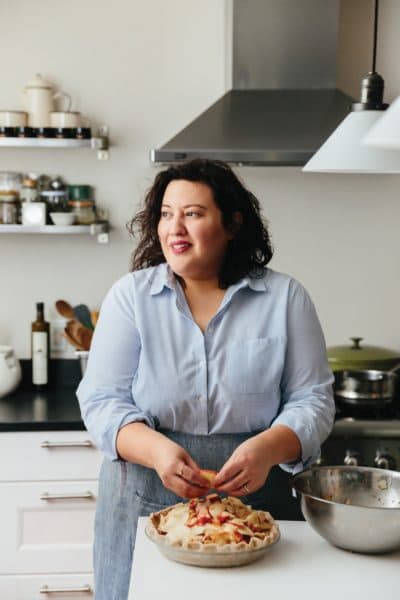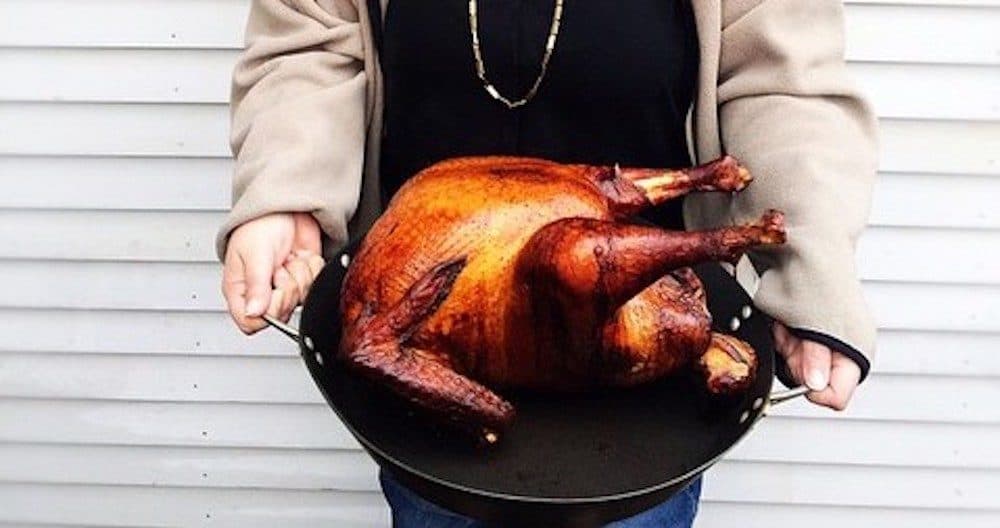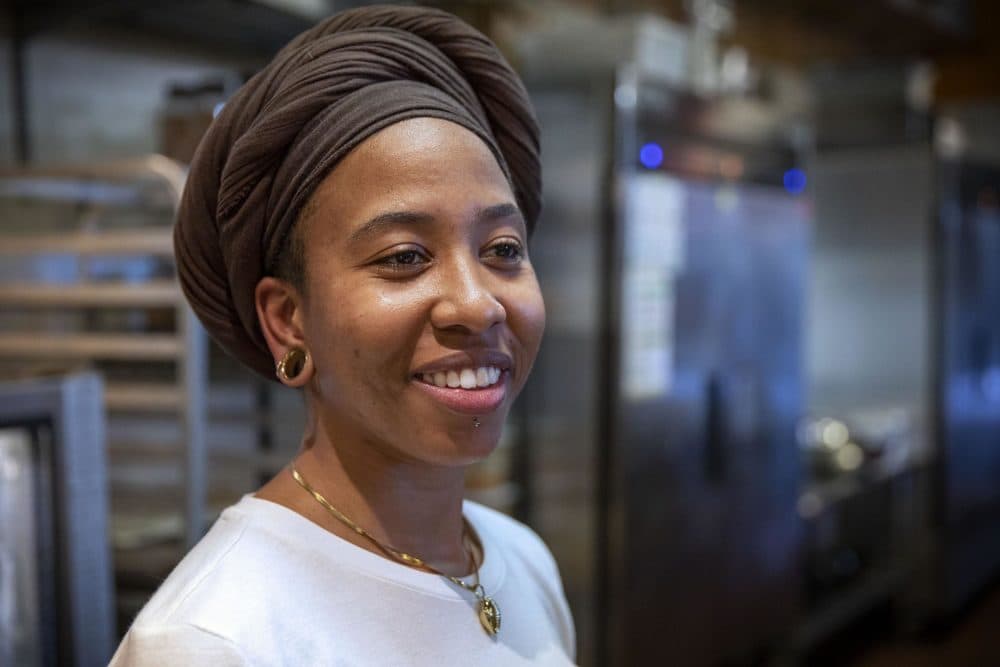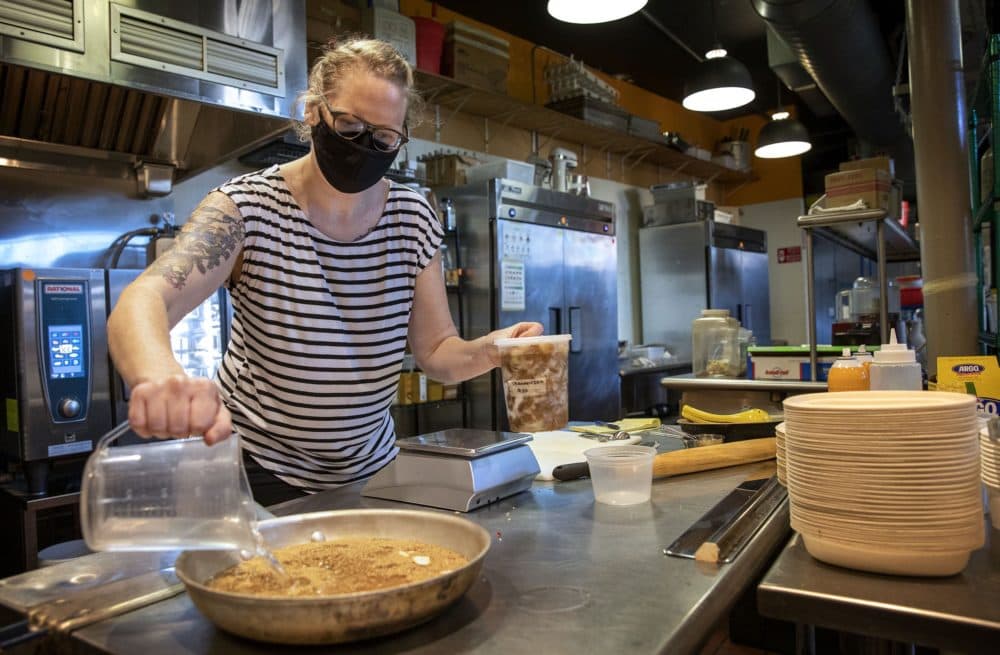Advertisement
Finding Meaning, And Making Alternative Plans, For A Pandemic Thanksgiving
ResumeThanksgiving plans and traditions have been thwarted by the pandemic. But people are coming up with new ways to make the holiday meaningful for themselves and for others in a tumultuous year.
Cookbook author, podcaster and food maven Maggie Battista's typical Thanksgiving is like an annual reunion.

“Normally I'm the host,” she said. “Fifteen to 20 people would come to me and we'd have big tables and do multiple turkeys and all that stuff.”
Battista's relatives would pile into their cars and drive up from New York and New Jersey. They'd crash in hotels and converge on her Lynnfield home for a delectable feast. “Normally there's tons of kids running around,” she said, and after the meal the whole family would take long walk on the beach.
But trying to make Thanksgiving happen the old way — especially with an aunt and uncle in their 70s — has been complicated.
“We literally spent days trying to figure it out,” Battista recalled. Her relations batted around all sorts of potential solutions. “OK, what if we all split up?” they asked, “What about the people with kids who are in New York — let them get together and eat outside — and then all the adults who don't have kids, we all quarantine and then get together?”
Conversations about what's possible and what isn't have forced families across the nation to jump through all kinds of hoops in the hopes of salvaging their upended holiday. The wave of contortions does not surprise Catherine Sanderson.
“We have a bunch of times in which we traditionally, as a society, gather — with friends, with family,” she said, “and we also have rituals that are meaningful.”
Sanderson chairs the psychology department at Amherst College and said long-established customs give structure and guidance to many of our lives. “Many people are experiencing a lot of trepidation and anxiety about how they are going to manage during these next couple of months,” she said.
Sanderson herself is an expert worrier, which she admits is ironic since she wrote a book to help others develop flexible mindsets called "The Positive Shift." This year she suggests people let go of past and even future expectations as they try to rethink the holidays. “What traditions they can have, what traditions they can modify, and what new traditions they want to create,” she ticked off.
Breaking routine could be especially valuable for families who've lost loved ones to the coronavirus.
“For people who are suffering from the actual absence of people because of the pandemic, it may be better to say, 'This is a year we are doing a new and different tradition, that will help us create something that is positive, that is affirming, and that will reduce our natural human tendency to compare to what could have been or what has been,' ” Sanderson said.
Alternatives could include a change of scene, eating outdoors with blankets, organizing side dish and pie swaps or ordering takeout to support a struggling local restaurant. And of course there are the virtual ways to connect with folks who are far away, perhaps even for the meal itself.
“Maybe the different families can prepare those same foods on their own and they can eat in different parts of the country — or even parts of the world — these same family traditional dishes,” Sanderson suggested. “And they can gather together on Zoom and tell the same stories, have a toast, do a candle lighting or whatever they used to do normally.”

Maggie Battista might Zoom for a bit with her extended family, but the in-person Thanksgiving day event will be smoking the annual turkey outside with her husband and sister who lives locally. Quarantining beforehand is also part of their plan. They'll still have green beans and a sweet potato soufflé that's typically made by their cousin's wife.
Battista said she might zen out in the kitchen while making a way fancier pumpkin dessert topped with baked meringue. And she'll still go for her annual walk with her husband and sister, but they'll also share videos with everyone who couldn't make the trip.
The trio has also been discussing how they might treat all of the holidays different this year, “and do something like watch the 'Star Wars' [series] from beginning to end — all 20 hours,” Battista said. “The thought of it makes me a little crazy, but I am all for doing something that we'd never be able to do with 15 or 20 people around.”
Battista will also be taking stock of how fortunate she is for all that she has, which has been made abundantly clear to her while working with the Latinx community through La Colaborativa in hard-hit Chelsea.
“I think that gives me perspective and it doesn't make me so strident about maintaining my past holiday experiences,” she said.

But there are a lot of people who find alternatives to Thanksgiving every year. For Native Americans like Misha Thomas, it’s a melancholy time of remembrance.
“My familial elders typically will go to the Day of Mourning in Plymouth,” she said, “This will be the first year that I'm going personally.”
Thomas's family is of both Indigenous and African American descent. She explained how she's been reflecting on Thanksgiving’s complexities at her job as general manager of the Haley House Bakery, a social enterprise restaurant in Roxbury.
“It's always kind of felt like this really awkwardly contrived holiday that conveniently fits within the American narrative that's, like, this great thing for some of the people,” Thomas said, “while everyone else has to figure out how to make this meaningful for them.”
At Haley House, Thomas and her kitchen manager and chef Brie Garner are doing that this year by teaming up with a national collaborative of indigenous chefs called I-Collective. They've created a takeout menu featuring dishes made with native ingredients that's available throughout November for National Native American Heritage Month.

Thomas recalled how her team mulled over a lot of questions before they landed on the idea. “How do we make this impactful and meaningful and celebrate who we are and what we've all kind of collectively been through, but especially honoring the original people that were here before us?” she asked. “We spent a lot of time kind of working on that, like whose voice takes precedence here and why — and then how do we create new traditions around these things as well.”
In Haley House's kitchen, Garner split some small butternut squash and rolled the halves in chopped sunflower seeds for the Fall Harvest Salad. She was excited to list off a few of the other items on the menu. “We have a Juniper-brined turkey that's going with a wild rice and cornbread dressing, and a pineapple and apple compote.”
For her, the food feels like a return to the roots of American cooking before it was America. “This is what grew here. This is what was important. This is about knowing the land and acknowledging what's actually around us.”
Garner also said she's never felt good about Thanksgiving as a holiday. “It just doesn't seem like that is the part of our history that we should be celebrating,” she explained. “It is what we should be talking about and it is what we should be aware of, but I feel like there's a lot of erasure of history.”
Garner and Thomas both hope the Indigenous foods people take home raise awareness and spark constructive dialogue about the past. Thomas also reflected on the fact that it’s been a crazy year for everyone — with the pandemic, the racial justice movement and the election. In this moment she believes there are meaningful takeaways for the human spirit.
“No matter what your tradition is, we create meaning,” she said. “So if it's meaningful and it's special and it made you feel something great, then that's all that really matters.”
What are your plans for Thanksgiving? Our colleagues at Cognoscenti want to know for a piece they're pulling together. Submit your response here.
This segment aired on November 17, 2020.
